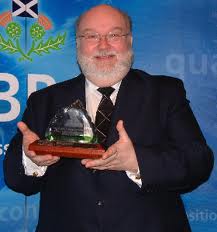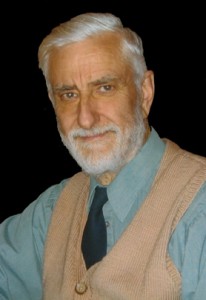Masters o'Wind
Royal Conservatoire of Scotland Wind Orchestra
Nigel Boddice and John Logan Conductors
Friday 18th January, Stevenson Hall, 5.30pm
Lincolnshire Posy - Percy Grainger
Owls and Pale Maidens - Derek Healey
World Premiere Concertino for Flute - Cecile Chaminade
Rondo Burlesque - Gustav Mahler, arr Adam Gorb
The 1912/13 Winter deep freeze luckily came late to Glasgow, and any potential audience for the Royal Conservatoire of Scotland Wind Orchestra on Friday 18th January should have been encouraged by clement weather, catholic programming and excellent playing, the last two due to the conductors of the Orchestra, Nigel Boddice and John Logan, Head of Brass at the Conservatoire since 2011.
Nigel, formerly Principal Trumpet with the BBC Scottish Symphony Orchestra, is one of the most experienced conductors working in the field of wind and brass bands, with a formidable list of commissions and world premieres to his name. In recent years he has programmed two of Derek Healey's works, One Midsummer Morning and English Dances; Healey's most recent wind work, Owls and Pale Maidens, was written especially for and dedicated to the Royal Conservatoire of Scotland Wind Orchestra and Nigel, who gave an authoritative first performance.
The work is a single movement tone poem, some sixteen and a half minutes in duration, cast in a contemporary but completely approachable musical idiom, a homage to two Glasgow artists of the first part of the 20th century, Frances Macdonald and James Herbert McNair, who with Frances' sister Margaret and her husband Charles Rennie Mackintosh formed the legendary "Glasgow Four", the leaders in the Art Nouveau movement in Great Britain. I had the benefit of hearing two rehearsals of the new work; it made quite an impression on me at first hearing, and by teatime on Friday I found it utterly compelling, a work that I want to conduct and indeed publish as soon as possible.
The opening motif is built on a minor third, fff descending to ppp diminuendo, and this in various guises represents The Owl, a signature motif for McNair in his designs. In this work it runs throughout, sometimes softly lyrical, plaintive, sometimes screeching over low brass and percussion. Contrast is provided almost immediately by a five note theme representing Frances Macdonald and her pre-Raphaelite Pale Maidens, gently suggested by oboes and flutes in G major, alternating with The Owl in G minor. Other thematic ideas abound, a rising arpeggio in the bass clarinet, muted thirds in the horns reminiscent perhaps of Holst, an almost Wagnerian motif in the trombones, a sweeping gesture on vibraphone, harp and piano. The mood intensifies with a piu agitato, brass ostinato accompany high woodwind. The main thematic and harmonic shape of the work is clearly stated and then developed at times through lyrical melodies of great beauty, at times through a dazzling variety of orchestrations and dynamic changes, before dying away in a heart-felt coda.
The concert began with a well-known warhorse, Lincolnshire Posy, still a challenge after seventy five years with its huge demands on dynamics and articulation. It was immediately clear that this is a fine wind orchestra, solos were taken confidently, balance within sections was well judged, with the brass never overpowering the woodwind except when necessary at final cadences, and on the whole a great dynamic range. Ensemble was tight and crisp, and there were some fine individual contributions, notably oboe, soprano saxophone and bassoon in their second movement canon, euphonium in the same movement, a superb brass choir in Lord Melbourne although I would have loved a lot more tuned percussion in The Lost Lady Found.
The Conservatoire is clearly doing a great job with its short courses and outreach schemes; the soloist, Jillian Hunter, in the Chaminade Concertino for Flute was selected as the winner last year of the solo award in the Scottish Concert Band Festival, and is now a first year student. She has a wonderful sound in every tessitura, a formidable technical command, and a complete grasp of this charming but challenging work. Despite the somewhat heavy arrangement, balance and ensemble were no problem under Nigel Boddice's excellent direction; I would like to hear Jillian in a concerto specifically written for flute and wind orchestra, such as the Concerto Pastorale of Philip Wilby, Mike Mower's Concerto, Joel Puckett's Shadow of Sirius, the hilarious Instant Music by Kurt Schwertzig or the Lindisfarne Rhapsody by Philip Sparke. My only small quibble with her performance was that she sometimes displays a lack of clarity in articulation of repeated notes, which led to the occasional hurrying in passage work.
The final work in the programme was Adam Gorb's virtuoso arrangement of the Rondo Burleske from Mahler's Symphony No 9, a real tour de force which takes no prisoners. I have for the last thirty years loved the wind orchestra and consider it the finest possible training for orchestral wind, brass and percussion, especially in an arrangement like this. There is no hiding place here, everyone is a soloist, each player has to be prepared to extend the dynamic range enormously and still control tone and pitch at the extremes of the tessitura. There was some remarkable playing by all sections, perhaps especially by the first trumpet and not least in the high woodwind writing which can easily degenerate into a screech, while the pianissimo accompaniment in lieu of strings was breathtaking. The technical demands were all met superbly, and the conducting was in the very capable hands of John Logan, whose experience of playing Mahler in CBSO, RSNO and other orchestras told in his splendid handling of the contrapuntal intricacies of the score. Does Gorb's arrangement stand up? For me, a non-equivocal and resounding yes. As a training piece it is second to none, and in many ways the diabolical nature of the original and the vicious parodies of military and fairground music are all enhanced in this version. In short, a terrific finale to a thoroughly enjoyable concert, a tough programme given exemplary, very committed and exciting performances.
Tim Reynish
Share this Article:




